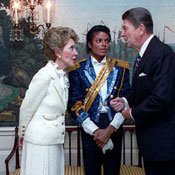I recently had an hour to kill in the airport, so I indulged myself and picked up a few tabloid magazines inundated with Michael Jackson stories. In the weeks following Jackson's death, I was dismayed to see the media shift its focus from the genius of Jackson's musical contributions to speculation over how he died. The cover of Life & Style captures the theme perfectly: "Who Killed Michael Jackson?"
The source of Michael Jackson's death is no mystery: He killed himself, slowly, with an addiction to painkillers and anorexia-induced starvation. The responsible question isn't who killed Michael Jackson but why he killed himself.
Given the unspoken guilt attached to the litany of MJ tributes, it seems we already know the answer: We made him hate himself.
Over the past 15 years, Michael Jackson's name became synonymous with eccentricity. In that time, he was the subject of constant ridicule, some of it self-imposed. Everyone has heard a Michael Jackson joke, nearly all of them involving child molestation or rapeunspeakable crimes for which Jackson has never been convicted.
Many have portrayed him as a traitor to his race, because he may or may not have undergone surgery to whiten his skin. (Ironically, whites have often led this charge.)
Mentioned less is the fact that Jackson was one of the most race-conscious artists of his generation. Almost single-handedly, Jackson introduced black music to MTV and into the living rooms of a new generation of music fans. Sadly, more people seem to dismiss his song "Black or White" as Jackson's attempt to justify his plastic surgery rather than praise it for what it truly is: one of the few songs openly discussing racism with the fortitude to market itself to the pop charts.
But despite Jackson's international stardom, or perhaps because of it, media outlets have taunted Jackson and encouraged his self-destruction. Not only has every mass-market tabloid had a go at him, but ABC aired Martin Bashir's controversial 2003 documentary, "Living With Michael Jackson," in primetime, reportedly driving Jackson to further addiction. It was a reprehensible piece that spat on the notion of journalistic integrity with unsubstantiated implications that Jackson was a sexual deviant.
Only in death has the obvious fact emerged that Jackson was a near asexual entity. His attempts to recapture a lost childhood were, at best, bizarre and misguided, but never criminal or pedophilic like Bashir and other reporters have suggested.
But it's not just the media's fault. We must acknowledge the role we ourselves play as spectators. Consider this: An invasion of privacy may be collateral damage to one's decision to act, sing or dance, but it's clear that Jackson never chose to become a star. By age 7, he simply was one. And, despite his media high jinks, he told us again, and again through words and actions, "Leave me alone."
The fact that we chose to view Michael Jackson's sensitivity and compassion as passiveness and perversion is, itself, troubling. If just a fraction of the glowing articles about Jackson's music and character published the days following his death had been written while he was still alive, perhaps the spectacle of his Los Angeles funeral would never have been necessary.



Comments
Use the comment form below to begin a discussion about this content.
comments powered by Disqus